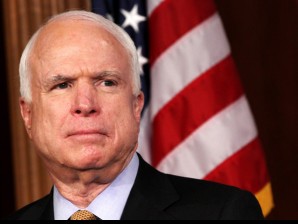Republican rift seeping into US foreign policy
WASHINGTON – The Republican Party is fracturing along an interventionist-isolationist fault line, experts say, with Tea Party upstarts tangling with traditionalists and setting the stage for an ideological battle ahead of 2016 elections.
Old-guard Republicans like Senator John McCain hew to the traditional line that the exertion of American power is the primary force of good in a chaotic world.
They advocate supplying weapons to rebels in Syria, aiding Egypt despite the turmoil of the recent military coup, and using all tools at US disposal, including the surveillance of hundreds of millions of citizens, to keep America safe.
But insurgent conservatives, led by libertarian-leaning Senators Rand Paul and Ted Cruz, are challenging that orthodoxy, and their influence has become difficult to ignore.
A case in point came before the Senate late last week when Paul introduced a measure that would block $1.5 billion in aid to Egypt.
Article continues after this advertisementHis amendment was handily defeated, but not before heated debate between him and McCain over the role of the United States abroad.
Article continues after this advertisementNotably voting with Paul and 11 other core conservatives was Mitch McConnell, the Senate’s top Republican. Together their vote bucked the position of AIPAC, the pro-Israel lobby that often finds Republican support in Washington.
Earlier this year McCain derisively called Cruz and Paul “wacko birds” on the Senate floor, citing their procedural opposition to virtually anything supported by President Barack Obama, including the US budget, immigration reform, drone use, the national health law and foreign aid.
“There may be more wacko birds in the Senate than is suspected,” Cruz, 42, sniped back at the 2008 Republican presidential nominee who is 34 years his senior.
Cruz passed a big test last month in Iowa, where he was warmly received by several hundred evangelical pastors, a group that carries huge influence over the outcome of the first-in-the-nation primaries.
Paul became a hero for many in March when he launched a 13-hour filibuster in the Senate to demand the Obama administration clarify its position on domestic use of drones.
Political observers see a test brewing ahead of the presidential race in 2016 and even the mid-term elections in 2014, when voters will be confronted with what appears to be two divergent Republican strains.
Michael Steele, a former chairman of the Republican National Committee, said recent ideological clashes have highlighted the “fracturing within the party.”
“The question is will the John McCain view prevail ultimately going into 2014, or will the Ted Cruz view prevail?” he told MSNBC.
The establishment’s growing unease with the upstarts – Paul led the Republican field in a recent PPP poll on the 2016 race – is likely what fueled a very public war of words late last month between two likely Republican contenders for the White House.
New Jersey Governor Chris Christie blasted Paul’s position on domestic surveillance, and House of Representatives lawmakers who nearly de-funded the intelligence program that scoops up telephone records on millions of Americans.
“This strain of libertarianism that’s going through both parties right now and making big headlines, I think, is a very dangerous thought,” Christie said at a mayoral panel.
Paul shot back that “spying without warrants is unconstitutional.” The two carried on their bickering for days until reaching an uneasy truce.
Congressman Peter King, the New York Republican who has chaired the House Homeland Security Committee, warned that the Tea Party favorites could threaten GOP aspirations for taking back the White House, especially if they were running against former secretary of state Hillary Clinton.
“I think she’s very strong on foreign policy, and I think that if we nominate someone from our isolationist wing of the party, she’ll destroy them,” King told ABC News, adding that their pushing of the national debate is “harmful to the country.”
Conservative columnist Charles Krauthammer argued in his Friday column that the return of conservative isolationism “was utterly predictable.”
After years of war in Afghanistan and Iraq, debate over countless drone strikes and the revelations of mass surveillance by the National Security Agency, “the natural tension between isolationist and internationalist tendencies has resurfaced,” he wrote.
Thomas Mann, a veteran congressional expert at the Brookings Institution, told AFP that while the Republican Party has largely accommodated the “economic libertarianism” of the Tea Party faithful in Congress, “true isolationists have little support among Republicans in office.
“With Americans weary of war, this could begin to change but it would presage a real crackup of the GOP,” he said.
